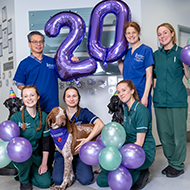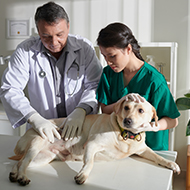Dogs given the dexmedetomidine gel displayed fewer signs of fear and anxiety than dogs in the placebo group.
Treatment reduces signs of fear and anxiety in dogs
Researchers have developed an oral gel form of dexmedetomidine that may be given by dog owners at home.
A study published in Veterinary Record concludes that the gel “significantly reduced behaviours related to fear and anxiety over time, and the overall effect and success of treatment were found superior to placebo.”
It adds that the dose used was “safe and devoid of any significant clinical sedative effect”. Furthermore, the new form of administration was found by owners to be easy to use across the range of dogs tested.
The innovation, developed by Orion Parma, is now available as a treatment on prescription.
In the study, researchers administered the gel or an identical placebo to 182 dogs with a history of acute anxiety and fear associated with fireworks noise. The experiment took place on New Years’ Eve 2012 and assessed the overall treatment effect in addition to signs and extent of anxiety and fear.
The study reports a higher proportion of dogs had a good or excellent treatment effect in the dexmedetomidine group (72 per cent) than in the placebo group (37 per cent). This means that the dogs did not show any signs of fear and anxiety, or the signs were mild and temporary.
It also reports that dogs given the dexmedetomidine gel displayed fewer signs of fear and anxiety than dogs in the placebo group, including panting, trembling and growling.
While the gel was found by owners to be easy to apply, the authors are reminding vets of the importance of instructing clients carefully on the correct use of new medications. They emphasise that a personalised treatment plan should be set up for every patient covering all appropriate treatment options.
The study has won this year’s Veterinary Record Impact Award for research that is considered likely to have the most significant practical impact by the journal’s research team. It was selected from some 150 papers published by Veterinary Record last year ‘due to its highly practical outcome for an issue often seen by vets in small animal practice’.







 Rabbit Awareness Week (RAW) is returning this summer, running from 24-28 June 2024. The theme for this year will be 'Healthy Diet, Happy Bunnies'.
Rabbit Awareness Week (RAW) is returning this summer, running from 24-28 June 2024. The theme for this year will be 'Healthy Diet, Happy Bunnies'.
